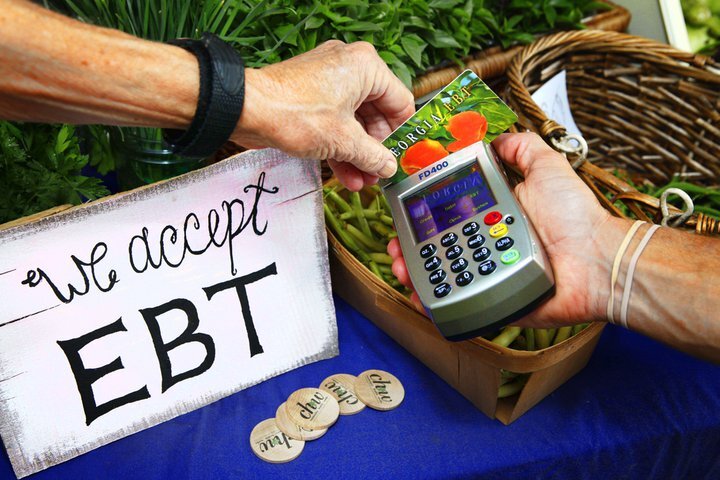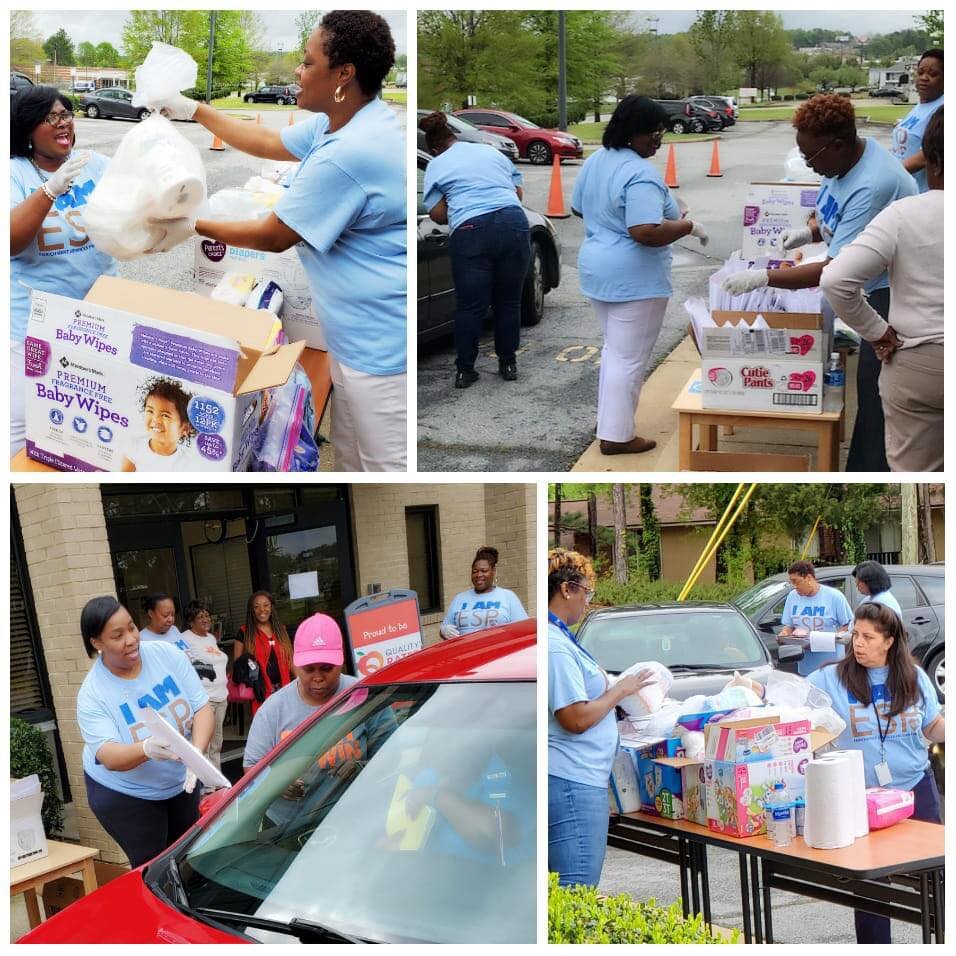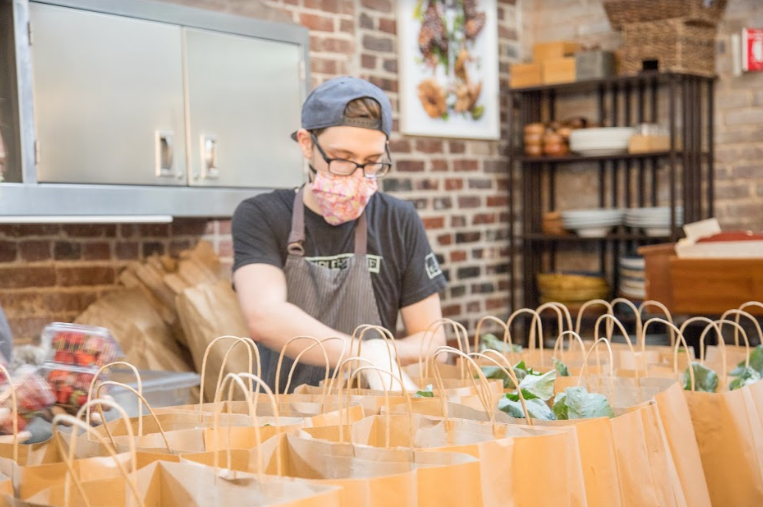By Kayla Williams
In the tumultuous months since March 2020, countless farms have had to change their sales outlets, the ways they interact with their customers, their weekly farm routines, and more.
Not only did they have the normal busy season of spring – when the earth is warming up, harvests are abundant, and planting starts for summer – they also had to create online stores, build new relationships, and, for some, change their entire business model. Here are four farms, all members of Georgia Organics’ Farmer Services Accelerator program (click to learn more) or the Farm to Restaurant Farmer Cohort program (click to learn more), and how they were able to pivot over the past four months.
Paul and Lindsey Sorah and Mark Golden of Hearts of Harvest Farm. (Photo courtesy of Hearts of Harvest Farm)
Hearts of Harvest Farm in Arnoldsville, GA
When Mark Golden, and Paul and Lindsey Sorah, co-owners of Hearts of Harvest Farm, decided they would plant 10,000 strawberry plants and 600 blueberry plants this fall for a summer 2020 U-Pick, they weren’t planning on the pandemic snatching that opportunity from them at the beginning of strawberry season in early May. Although it’s possible that they could have conducted a COVID safe, socially distant U-Pick operation, their insurance company didn’t feel comfortable writing a policy for them, and highly suggested they think of a different sales market for the thousands of pounds of berries that would be ready to fruit soon. For the first month and a half of COVID, Hearts of Harvest Farm offered pre-ordered veggie boxes to Athens, their home base, and Atlanta. They are also a part of Collective Harvest, a CSA cooperative in Athens, which allowed them to move product through their markets as well. However, when 10,000 strawberry plants ripen at the same time, no amount of pre-orders can sell all of the highly delicious (and perishable) fruit. Georgia Organics’ Food Fight GA initiative was able help to move approximately 120 pounds of berries. Although they didn’t hit the numbers they thought they could without the U-Pick, the diversified markets allowed Hearts of Harvest to at least break even, and make a small profit on the berries. Paul and Lindsey’s berry story points to the importance of diversified revenue streams for farmers. If one opportunity ends, at least there is the safety of other markets and networks to help move product and reduce waste. Regarding pivoting, Paul says it best, “The sales pitch is the same, it’s (local food is) fresher, safer, more nutrient dense, it’s investing in the local economy. That’s how we grow a strong America and economy – by keeping our money in our communities. We haven’t had to pivot the message. The amount of hands that touch your food matter.” You can find Hearts of Harvest Farm products at the Marietta Square Farmers Market on Saturdays from 9 a.m.-12 p.m., at the Athens Farmers Markets on Saturdays from 8 a.m.-12 p.m. and select products online through Athens Locally Grown.
Rag and Frass Farm at Grant Park Farmers Market. (Photo credit: Jenna Shea Photography)
Rag and Frass Farm in Jeffersonville, GA
Julia Asherman, owner and operator of Rag and Frass Farm in Jeffersonville, pivoted in multiple ways. Julia is the main organizer for the Middle Georgia Grower’s Cooperative (MGGC) and prior to COVID-19, the MGGC had a separate booth from Rag and Frass Farm at the Grant Park Farmer’s Market. When the pandemic began in early March, the co-op made a decision that Julia would represent both the MGGC and Rag & Frass at the farmer’s market, limiting the possible exposure from Atlanta to folks from Middle Georgia. “With the virus, it became really apparent that more people needed to work from the same stand (someone handling product versus someone handling money), so it made more sense to consolidate into one stand and have two folks working the market rather than four coming from Middle Georgia.” Although Rag and Frass Farm isn’t able to have the same brand representation as before, the farms’ sales have been about the same as last year as they added a pre-order option early on. In addition to the decision to consolidate the co-op and farm for the Grant Park Farmer’s Market, Rag & Frass Farm also expanded pre-orders into home delivery for Macon and Milledgeville. This added market has brought new customers from outside of Atlanta to the farm. Of course, the addition of pre-orders doesn’t come without complications. Packaging pre-orders takes more time and more space in transporting. But, Julia notes, she “feels comforted by the fact that if the farmers’ markets need to change in the coming months (as a result of increased COVID numbers), having the pre-order system in place means that they have the additional tools and customer base to at least partially make up for the possibility of lost sales.” You can find Rag and Frass Farm’s products at the Middle Georgia Grower’s Cooperative booth at the Grant Park Farmers’ Market in Atlanta from 9 a.m.-1 p.m. on Saturdays, the Mulberry Market in Macon from 3:30-6 p.m. on Wednesdays, at the farm on Tuesdays from 3-6 p.m., and you can place pre-orders/home deliveries to a variety of locations.
Howard Berk, co-founder of Ellijay Mushrooms. (Photo courtesy of Ellijay Mushrooms)
Ellijay Mushrooms of Ellijay, Georgia
When Howard Berk, co-founder of Ellijay Mushrooms, was accepted as a Georgia Organics Farm to Restaurant Farmer Cohort member in late February, he was ready and excited to build new partnerships and expand current partnerships with restaurants and wholesale around North Georgia. Of course, by early March, Howard was feeling nervous about his plan to expand to more restaurant sales. Through the Georgia Organics programs, Food Fight GA and Mid-Week Pop Up Market, Howard was able to continue selling his products to restaurants as well as expanding into a retail avenue. Building an online store for folks to place orders was a first crucial step to pivoting his business. In addition to the Georgia Organics COVID relief programs that Howard took part in, he also came up with a new recyclable packaging solution so he could safely explore the opportunity to sell his products to larger retailers. Through this new mushroom box that he created, he was able to sell mushrooms through The Common Market’s partnership with the USDA on their Farmers to Families Food Box program to distribute 15,000 boxes of food throughout Georgia and Alabama. In addition to these new markets, mostly based in subsidized programs to help feed the community, Howard developed new relationships with chefs feeding frontline workers. He has been able to donate nutritious mushrooms to the chefs for frontline feeding programs, allowing our most essential workers to get crucial nutrients while they work long and hard days. You can find Ellijay Mushrooms at the Georgia Organics Mid-Week Pop Up Market on Wednesdays, located at Wrecking Bar Brewpub in Atlanta by pre-ordering between Friday morning and Sunday night every week.
Rahul Anand of Snapfinger Farm. (Photo credit: Jenna Shea Photography)
Snapfinger Farm in Stockbridge, GA
The first thing Rahul Anand and Carson White of Snapfinger Farm did in early March, realizing the implications of the pandemic, was to sign up for an online store through Barn2Door, just in case they needed it. They also shifted their energy from selling to restaurants, formerly their largest sales outlet, to focusing on growing their CSA program. Even though they’ve never been very dependent on farmers’ markets for their income, Rahul secured a spot at the Grant Park Farmers’ Market. They added more drop locations around Atlanta for the CSA, and began selling through Food Fight GA as well. Rahul notes, “The biggest pivot is being really open to doing different things.” The ways in which Rahul and Carson set financial goals for the farm has shifted to a weekly basis, depending on how much they are able to sell at the beginning of the week determines how many chefs and other wholesale customers they will reach out to to fill the rest of the sales “pie” during the rest of the week. Snapfinger Farm also sells other farms’ products through their online store and CSA program – meat from Four Bellies Farm, eggs from Rise n Shine Farm, and mushrooms from Ellijay Mushrooms. Rahul has enjoyed being able to collaborate and support neighboring farms, as well as make connections with other wholesale accounts like being introduced to Chef Maricela Vega of 8arm through Russell Brydson of Narrow Way Farm and bringing eggs from Pinewood Springs Farm to Georgia Organics’ Mid-Week Pop Up Market at Wrecking Bar Brewpub. Through these collaborations, Rahul has also learned about other struggles that farmers have been facing during the pandemic, like how difficult it is for a local meat producer, like Four Bellies Farm, to secure an appointment with a processing facility because many have limited appointments and capacity over the past four months. Even though it’s disappointing to not be able to sell Four Bellies ground beef when they run out, it’s a good tool to tell the customers about the difficulty of finding a consistent and available processor. Rahul notes that the biggest takeaway from the pandemic, for him, is not leaving any opportunities on the table, whether it be going through the process to certify organic, ensuring Snapfinger’s employees have health insurance, and finding new markets to sell their products. Rahul’s flexibility and insight have served him well during these changing times! You can find Snapfinger Farm’s products at the Oakhurst Farmer’s Market on Saturdays from 9 a.m.-1 p.m., you can sign up for their CSA, and place pre-orders to pick up at either the Oakhurst Market or the Mid-Week Pop Up Market.
Kayla Williams is a Farmer Services Coordinator at Georgia Organics. To learn more about Georgia Organics, visit www.georgiaorganics.org and follow us on Instagram @GeorgiaOrganics, Twitter @GeorgiaOrganics, and at www.Facebook.com/GeorgiaOrganics.















































